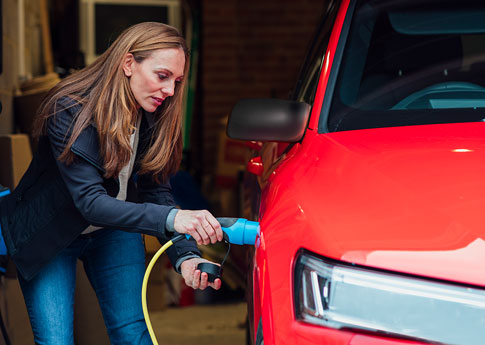5 FAQs about electric vehicles (EVs)

Looking to purchase a new vehicle and considering switching to electric? You’d have good reason to—the Quebec government plans to ban the sale of new gasoline-powered vehicles by 2035. But are you ready to make the switch? Is an electric vehicle right for you? What model should you choose? Here are the answers to the five questions most frequently asked of CAA-Quebec car experts.
1-How to choose the right type of electric vehicle?
Fully electric vehicle or plug-in hybrid? You can choose from several models depending on your needs. Before buying, consult our EV Buying Guide and ask yourself the following questions:
Is it for a primary or secondary vehicle?
How many passengers will you transport?
What items will you carry regularly? (e.g. hockey bag, stroller, suitcases, etc.)
What range do you need for your daily use?
Can you install a Level 2 charging station at home?
Do you drive more in the city or on the highway?
Does your workplace have access to 240-volt charging stations?
3 types of electric vehicles
Fully electric vehicle
Silent, powerful, efficient, and zero-emission, fully electric vehicles can be charged at home or at public charging stations for long trips. Range varies from 300 to 800km for certain models and offers excellent energy efficiency.
Plug-in hybrid vehicle
Uses both electrical energy and gas. When the battery is empty, the gas engine takes over. Great for long distances on a single tank.
Good to know: Plug-in hybrids require the same maintenance as gas-powered vehicles.
Conventional hybrid vehicle
Not eligible for government EV rebates, but conventional hybrids remain the most affordable option at purchase. With its two motors, it can improve fuel efficiency by up to 30% compared to a traditional emission vehicle.
Which EV should you choose?
Compare your options based on your situation.
Fully electric | Plug-in hybrid | |
|---|---|---|
| Only one household vehicle and you often drive long distances | X
| X |
| Only one household vehicle and you make short trips | X | |
Two vehicles at home* | X |
2- How much does an electric car cost?
Contrary to what many think, an electric vehicle (EV) is not always more expensive than a similar gasoline vehicle, especially in the long term. It’s important to consider the total cost of ownership, including both purchase price and running costs.
Here are the savings you can make by buying and using an EV:
Government rebates and incentives: Up to several thousand dollars in savings when buying or leasing a new electric vehicle. These EV incentives will gradually decrease until they are fully phased out in 2027.
Financial assistance for a charging station: The Government of Quebec usually reimburses part of the purchase and installation cost for a residential 240-volt charging station.
Energy savings: Up to 75% less expensive than gas. Over 20,000km, this represents about $1600 in savings compared to a gas vehicle consuming 8L/100km. Hydro-Québec offers an online EV savings calculator to estimate your potential savings.
Lower maintenance costs: EVs cost around $500 less per year to maintain. You avoid oil changes, air filter and spark plug replacements. Brake pads last longer thanks to regenerative braking, and there’s no exhaust system to replace.
Good reliability: Fewer mechanical parts means fewer unexpected repairs.
Insurance discounts: Some insurers, including CAA-Quebec, offer EV insurance discounts. Check with your provider!
An electric vehicle can be cost-effective… if you drive enough
To offset the cost of an electric vehicle, your annual kilometrage is a key factor.
Under 10,000km/year: You’ll need to keep your EV for several years to offset the price difference with a gas vehicle.
Over 20,000km/year: You could recover the difference in 2 to 4 years through savings on energy and maintenance.
In short, the more you drive, the more cost-effective and eco-friendly an EV becomes.
Buying a used electric vehicle
A used EV is a more affordable way to access the world of electric mobility. Some models may even qualify for government incentives (until 2027), under certain conditions. Before buying:
Take a test drive
Check the RPMRR (Register of Personal and Movable Real Rights)
Get a CARFAX report (to learn the vehicle’s history)
Have the vehicle inspected at a CAA-Quebec Authorized Inspection Centre
Ensure the high-voltage battery is in good condition and check whether it’s still under an EV battery warranty
Read our Used EV Buying Guide for further advice
3- What is the range of an electric car?
A range of 400 to 500km is common for today’s battery electric vehicles—almost as much as a gasoline car.
Interesting fact: 2 out of 3 Canadians drive less than 65km per day. That means the range of most EVs is more than enough for your daily needs.
Factors that affect EV range:
Additional equipment (roof box, bicycles, etc.)
Driving style
Charging time
Tip: Drive smoothly and plug in your car when not in use. The interior will be warmer when you’re ready to leave.
4- How long does an EV battery last?
EVs use lithium-ion battery packs, which last a long time. Major failures are rare. On average, manufacturers offer warranties of 8 years or 160,000km on the electric or hybrid powertrain.
While less frequent and less costly than gas car maintenance, electric car maintenance is still necessary.
These are the maintenance checks you will have to schedule for your EV:
Brake system cleaning once or twice per year
Suspension checks
Rustproofing (optional but recommended)
5- Are electric vehicles really eco-friendly?
Yes. EVs are more environmentally friendly than gasoline vehicles. But you need to consider the full lifecycle of the vehicle—from production to recycling.
The production of battery-powered electric vehicles does have an environmental impact. Extracting raw materials emits greenhouse gases. Some processing steps, especially in China, are highly polluting.
However, an EV more than compensates for that initial impact. In Quebec, electricity generation comes from renewable energy sources. Over time, an EV has a much smaller carbon footprint than a gasoline vehicle. And while driving, it emits no air pollutants harmful to humans.
Good to know: Progress in battery recycling and metal recovery continues to reduce the environmental impact of EVs.
How can you reduce your impact with your car?
Keep your vehicle for a long time—even if it means keeping your current gas car. Just make sure it’s well maintained.
Switch to electric with confidence
With the variety of available models and long-term savings, there are many reasons to consider an electric vehicle. Thinking about making the switch? Check out our resources and take advantage of CAA-Quebec’s Mobility Advisory Services to guide you every step of the way.
Listen to the Sans détour podcast on electric mobility
Enjoy member-exclusive services and discounts for EV drivers
Need more info about electric vehicles?

Check out our section on electric vehicles
You’ll find buying and maintenance tips for EVs and charging stations, exclusive discounts and offers, and plenty more.
Benefit from personalized advice
Engine types, charging, incentives…
